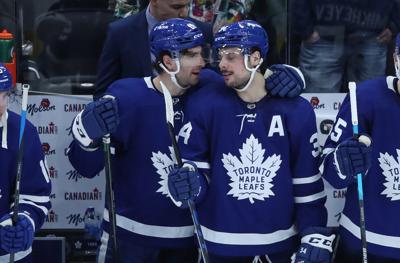There’s not a single NHL team that would tell you its success or failure last season was primarily or even significantly due to the identity of its captain.
Florida didn’t win the Stanley Cup solely because of Alexander Barkov’s captaincy. Edmonton didn’t lose Game 7 because Connor McDavid didn’t wear the C effectively.
It’s all window dressing, folks.
If wearing the C was ever truly a big deal in the league in terms of influencing a team’s success, it was a long, long time ago. It’s purely symbolic today, or at most one small part of the complicated overall construction of a team.
So the fact that Auston Matthews is about to take over from John Tavares as the Leafs captain is unlikely to alter the arc of the team’s future on its own. That won’t stop some from treating it as such. But to the hockey team? This won’t decide whether the team gets out of the first round next spring. It won’t even be a minor factor. Matthews’ teammates, you can bet, would just be thrilled if he scored 69 goals again.
That, naturally, won’t stop folks from making a big fuss over it, and to be fair, this period between the end of the Summer Olympics and the first week of September is likely to be one of the least newsy times of the 2024 sports calendar. Thank goodness for stories like Nathan Rourke going back to B.C., or for the raid by the St. Louis Blues on the depth chart of the Oilers.
Matthews getting the captaincy of the Leafs is a less impactful story than either of those. But because it’s the Leafs, it will be treated as a big deal and, of course, a stick with which to beat the perennially underachieving hockey club. It was no surprise some of the early reaction was to question whether this was all disgraceful treatment of Tavares, or to suggest this superficial move was the sum total of GM Brad Treliving’s team-improvement efforts over the off-season.
Let’s be clear on the latter issue. This is the kind of move you make when you’d like to make a very good team better but the combination of salary cap considerations and the absence of available impact players from other teams make major improvements virtually impossible.
So, you fire a pretty successful coach and bring in a new one with a Cup-winning resumé. You sign a gritty veteran defenceman to a contract that he’ll never be able to live up to in full. You keep Max Domi because he’s popular and versatile, sign the very average Oliver Ekman-Larsson because he just won a Cup with the Panthers, and anoint youngster Joseph Woll as the latest saviour between the pipes.
Finally, you name a new captain. None of these moves will reduce the irritation of those who were convinced the team should have been torn up after losing Game 7 to Boston last spring. Moreover, you cannot argue the Leafs are a better team talentwise now than they were back then. To be better, they’ll need youngsters like Fraser Minten and Easton Cowan to be ready for full-time NHL duty, Woll to be healthy for more than three weeks at a time and Mitch Marner set to be the player he was before last season.
The changes the Leafs have made this off-season, including transferring the “C,” amount to a different look for the team. Nothing more, nothing less.
The Tavares question, meanwhile, is an interesting one. He arrived in 2018, became captain the next season and has pretty much played his heart out ever since. His biggest challenge has been that his numbers haven’t matched his $11-million (U.S.) annual stipend.
Tavares hasn’t been a bad captain. He’s been reliable and effective. But it’s hard to be known as a good or great captain when the team doesn’t succeed in the post-season.
Passing the captaincy to Matthews is, quite possibly, the first step in a larger plan to keep the 33-year-old Tavares as a Leaf beyond the expiration of his contract this season, and in a more comfortable position for an aging player. Take away the glare of the captaincy and assume that if he wants to stay a Leaf, he’ll do so at a much lower salary, and the fit suddenly seems a lot better. Nearly perfect.
Remember, Tavares only got the captain’s job because Matthews, then 22, got himself into an embarrassing off-season scrape in Arizona back in the summer of 2019.
Five years later, Matthews has three times been the NHL’s best goal scorer and once been the MVP of the entire league. He’s Toronto’s best and most productive player. He’s unique among the NHL’s top offensive players because he’s very strong in his own zone. He can lead by example.
Can Matthews be better? Likely not as an individual, but he can be perceived to be better if the team generates more post-season success. And that’s what this is all about. Perceptions. And changing the conversation.











To join the conversation set a first and last name in your user profile.
Sign in or register for free to join the Conversation